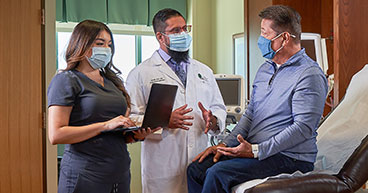
You might think only women should worry about having a BRCA1/2 mutation. After all, for nearly 30 years—since the discovery of the BRCA1 and BRCA2 genes—countless studies and news articles have chronicled the impact of the discovery on breast cancer, which affects women more than any other cancer.
But BRCA1/2 mutations raise cancer risk for men, too. And men are just as likely as women to have alterations in one of these genes.
In this article, we’ll explore:
- BRCA1/2 genes in men
- Can BRCA1/2 gene mutations be passed from father to daughter?
- Does a BRCA1/2 gene mutation in males increase cancer risk?
- BRCA1/2 genetic testing for men
If you’ve been diagnosed with cancer and are interested in a second opinion on your diagnosis and treatment plan, call us or chat online with a member of our team.
BRCA1/2 genes in men
BRCA1 and BRCA2 work in the body to help repair damaged DNA. Each person is born with two copies of BRCA1 and two copies of BRCA2—one copy from each of their parents.
Inheriting a BRCA1 or BRCA2 gene mutation increases your risk for developing several types of cancer, including breast cancer, ovarian cancer and pancreatic cancer in women, and prostate cancer, breast cancer and pancreatic cancer in men. According to the National Cancer Institute, inheriting a BRCA1/2 mutation also makes you more likely to develop cancer at a younger age than if you didn’t carry the variant.
A man’s risk of developing prostate cancer due to a BRCA1/2 mutation is about 60 percent, similar to a woman’s risk of developing breast cancer with the same mutation. However, a man’s risk of developing breast cancer with the mutation is about 7 percent.
While men may be less likely to be tested for a BRCA mutation, they should consider it if they have:
- A personal or family history of male breast cancer
- A personal or family history of at least two men with aggressive or metastatic prostate cancers (Gleason score of 7 or higher)
- A personal or family history of pancreatic cancer and one or more relative with breast cancer, ovarian cancer and pancreatic cancer
- A family history of ovarian cancer; female relatives who developed breast cancer at a young age (earlier than 50) or who developed multiple primary breast cancers; or three or more female relatives with breast cancer at any age
- A family history of breast cancer, ovarian cancer, pancreatic cancer, prostate cancer or melanoma
- Ashkenazi Jewish ancestry and a personal history of breast, ovarian or pancreatic cancers, aggressive prostate cancer, or melanoma
- A known family history of a BRCA1 or BRCA2 mutation
Can BRCA1/2 gene mutations be passed from father to daughter?
The BRCA1 and BRCA2 genes are not on either the X or Y chromosome, which means they’re not sex-specific and can be passed down at the same rate by both fathers and mothers, says Rachel Reagle, MS, Licensed Certified Genetic Counselor at City of Hope®.
“Men and woman with a BRCA1/2 mutation can pass it on to either their sons or daughters,” she explains. “There’s a 50 percent chance the children of a man (or a woman) with a BRCA mutation would have the same mutation.”
Does a BRCA1/2 gene mutation in males increase cancer risk?
There are subtle differences between BRCA1 and BRCA2 mutations when it comes to cancer risk.
On average an American man has about a 13 percent chance of developing prostate cancer in his lifetime. Those chances may double to up to 26 percent for men with a BRCA1 mutation and up to 61 percent for men with a BRCA2 mutation.
“There can be quite a significant risk of prostate cancer with a BRCA2 mutation,” Reagle says.
Plus, having a BRCA1/2 mutation may be associated with advanced or metastatic prostate cancer, meaning cancer that’s spread from the prostate to other parts of the body. When it spreads, prostate cancer is often found in lymph nodes and bones. It may also spread to the lungs, liver and brain.
Similarly, for male breast cancer, the average lifetime risk is less than 1 percent. A BRCA1 mutation takes the potential risk up to 1.2 percent while a BRCA2 mutation increases the risk to between 1.8 percent and 7.1 percent.
Those numbers still make male breast cancer rare, Reagle says, but they’re important for men to keep in mind if they have a BRCA1/2 mutation. Because men don’t routinely screen for breast cancer or may not be aware they are at risk for breast cancer, it is often diagnosed in late stages when it may be more difficult to treat.
A BRCA1/2 mutation also carries an increased risk for pancreatic cancer in both men and women. While the average lifetime risk for pancreatic cancer is about 1 percent, a BRCA1 mutation increases it to up to 5 percent, and a BRCA2 mutation raises it to between 5 percent and 10 percent.
“There’s also some evidence there may be an increased risk for melanoma,” Reagle says. “Researchers don’t have specific numbers,” she explains. “It’s just that they see an overrepresentation of melanoma in families with a BRCA2 mutation.”
For that reason, screening guidelines typically recommend anyone with a known BRCA1/2 mutation to visit their dermatologist for annual skin checks and protect their skin from the sun’s harmful UV rays using sunscreen and sun-protective clothing.
BRCA1/2 genetic testing for men
Like women, testing for a BRCA1/2 mutation in men is primarily performed via a blood test, although sometimes a saliva sample is used, Reagle says.
“Overall, one of the most important things to point out about genetic testing is that it often costs less than $100,” she says. “It used to be much more expensive, and many people still think it is, but, usually, most patients we see with insurance are able to pay between $0 and $100.” This may depend on many factors such as individual insurance plan including deductible and co-insurance, the laboratory performing the genetic testing, and a person’s personal and/or family history. Genetic counselors can help navigate the logistics of genetic testing including any questions related to insurance coverage and out-of-pocket cost.
Men who test positive for a BRCA1/2 gene mutation need to take a few precautions, Reagle says. First, they should make their doctor aware of their increased prostate cancer risk and consider additional prostate cancer screening, such as scheduling more frequent prostate checks or prostate-specific antigen (PSA) testing. Their doctor also may perform clinical chest exams and recommend regular self- chest exams to monitor their breast tissue for any lumps or bumps.
The National Comprehensive Cancer Network (NCCN) recommends men with a BRCA1/2 mutation begin annual breast exams at age 35 and, depending on whether they have a BRCA1 or BRCA2 mutation, consider starting prostate cancer screening at age 40.
In addition, men with a BRCA1/2 mutation should let their family members know they’ve tested positive, so they can consider genetic testing for themselves. As we discussed above, parents, siblings, and children would each have a 50 percent chance to have the same BRCA1/2 mutation.
If you’ve been diagnosed with cancer and are interested in a second opinion on your diagnosis and treatment plan, call us or chat online with a member of our team.



